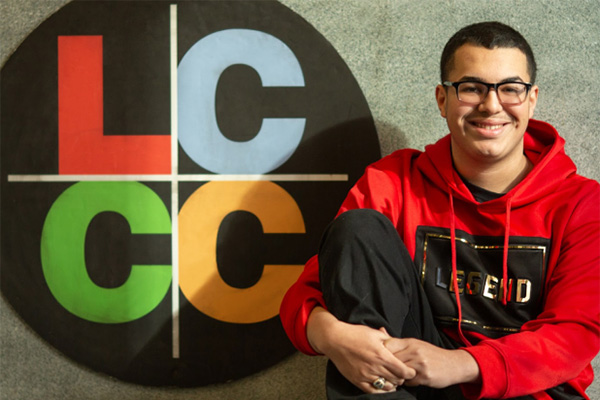Dancing to Her Own Beat

When you speak to Samantha Fruhwirth, one thing becomes very clear: she is not afraid to dance to her own beat. A 2015 graduate of LCCC, Fruhwirth hails from Emmaus and currently resides in Harlem. She is an architectural designer, dancer and entrepreneur. Samantha began her time at LCCC studying mechanical engineering before graduating in 2015 with an associate degree in mathematics. Her journey, however, is far less linear than simply achieving a degree, and like so many, her path didn’t become defined without a little help along the way.
 “The first decision to attend LCCC was made by my father,” said Fruhwirth. “I was really of the mindset that I wanted to go away to this four-year college and have the college experience I deserved, all the ego stuff when you’re 18.” Samantha’s family simply couldn’t afford the schools she was considering without burdening her with a lifetime of debt. “My dad said ‘it’s not just about you, it affects the entire family.’”
“The first decision to attend LCCC was made by my father,” said Fruhwirth. “I was really of the mindset that I wanted to go away to this four-year college and have the college experience I deserved, all the ego stuff when you’re 18.” Samantha’s family simply couldn’t afford the schools she was considering without burdening her with a lifetime of debt. “My dad said ‘it’s not just about you, it affects the entire family.’”
Fruhwirth, like many others, felt she was settling. “At that time there was all of this negative rhetoric making fun of the school, but I decided to make the best of it.” It only took a few days on campus to change any previous opinions she had. “Once I got there, my entire perspective shifted. I never had a fully negative impression of community college, and once I was actually there I understood its power. I felt really supported.”
Despite how much she enjoyed studying at LCCC, it was the flexibility and support to chase her dreams that truly changed her life. “I had this opportunity to be part of a professional dance company in Princeton, NJ,” said Fruhwirth. “When I came to my advisor I said ‘I really want to take this opportunity, it’s been a lifelong dream, but I really enjoy it here, how can we make this work?’” Taking a leave of absence at just about any four-year college or university would mean forfeiting your spot in your selected program of study. “We came to an agreement that I could take a hiatus for two years and be able to return to the program should I choose to finish my studies. I eventually took up that offer once my contract ended with the dance company.”
It was not an easy transition to make. “Keep in mind I was dancing for two years and not really using my brain in an academic way, and when I came back to LCCC I picked up where I left off studying mechanical engineering,” she said. “I literally lived in the math help room. A few of my friends and classmates lived there too, and we really made this beautiful community, and that’s what I love so much about LCCC; you’re able to make and find a community for yourself. It’s a beautiful and nurturing environment and I just want people to know that.”
“Besides the economic advantages, the benefits of community college are all encompassing,” said Fruhwirth via Zoom from her home in Harlem. “You get the amazing opportunity to recreate your academic standing at the collegiate level, which then gives you transfer status which opens so many options.” Her academic and extracurricular profile was in excellent standing, but she found her test scores weren’t where they needed to be. “For me it was like ‘oh, I can use this to get to where I really wanted to go’ by using my academic transcripts to actually represent who I am as a scholar, rather than some test.”
Fruhwirth also recognizes the benefit of community college as a place to explore your path and grow. “Community college gave us a more “real world” college experience. Since we all lived off campus, had to commute each day and balance school with life, these situational elements helped us learn the importance of personal responsibility and performance. Going to school wasn’t just a walk across campus or rolling out of bed in a dormitory, it was an active choice each day to show up and keep learning.” Fruhwirth, the 2020 LCCC Honors Induction Speaker, wanted to emphasize this when welcoming the class of 2020.
 Having graduated from Columbia University, Fruhwirth uses her past experience to thrive in her current setting. “I’ve always had this life-academic balance, and it gave me a more mature world view. The ability to take two years off to pursue dance provided me with real world experience of living on my own, working, and pursuing a passion.” It’s the combination of life and school that Fruhwirth simply couldn’t get at a four-year college. “When considering Columbia I didn’t think I could get in, but it was my boyfriend at the time who believed in me and encouraged me to apply. He told me about this program at Columbia for non-traditional students and because of my dance experience coupled with my honors transfer status, I met the criteria and was able to be accepted. LCCC allowed me to do that.”
Having graduated from Columbia University, Fruhwirth uses her past experience to thrive in her current setting. “I’ve always had this life-academic balance, and it gave me a more mature world view. The ability to take two years off to pursue dance provided me with real world experience of living on my own, working, and pursuing a passion.” It’s the combination of life and school that Fruhwirth simply couldn’t get at a four-year college. “When considering Columbia I didn’t think I could get in, but it was my boyfriend at the time who believed in me and encouraged me to apply. He told me about this program at Columbia for non-traditional students and because of my dance experience coupled with my honors transfer status, I met the criteria and was able to be accepted. LCCC allowed me to do that.”
Now living in New York City, the decision to go to community college is again paying dividends. “Having the opportunity of not being coddled in an academic environment allowed me to flourish after I transferred, rather than being thrown into the world after a college campus experience.”
Samantha’s life experience spans the globe. She was able to fulfill a lifelong dream of traveling to Japan. “At Columbia, study abroad credits are counted as transfer credits, since I maxed those out, I wanted to figure out another way to travel abroad,” said Fruhwirth. “I randomly saw a poster advertising a two-week teaching program that was independently sponsored. You’re partnered with a Japanese university student and create a seminar style course for Japanese high school students. The program wanted to break the mold of the typical Japanese high school class experience.” During her two trips to Japan, Fruhwirth led two seminars: one on the science fiction of poetics, and one on how to live a happy and healthier life. “I really wanted to connect with these kids, and make a difference for them whether it was a shift in perspective or new activity.”
After teaching abroad in Japan, Fruhwirth joined two of her friends who were creating a food startup based in Brooklyn. “It’s called Jianbing Company, and we specialize in savory Chinese crepes from the Shanghai area, essentially a savory wrap,” said Fruhwirth. “It was an amazing experience to go from the ground up with my best friends making this company. It really flourished.” Though the COVID-19 pandemic has dealt the company a blow, they remain operational through a new community-centric food service program. “In the beginning, we would design and build by hand our own stands for several outdoor and pop-up food markets.” she explained. “I’d have school during the week and then manage our pop-up markets on weekends, but after three years I wanted to focus on my own dream. I’m still part of the company, but no longer actively involved in its operation.”
The decision to take on a lesser role with Jianbang came with the desire to pursue her passion of architecture. Currently working with GRO Architects as an architectural designer, Fruhwirth has a goal to change the way we think about the built environment. “I love architecture, but not in the way in which the current system is set up,” said Fruhwirth. “Architects are public servants, and we need to be creating a built environment for people to live healthy lives, build community, and coexist with nature. Our structures dictate how we live and interact and ultimately manifest ideas about the world.” Currently, Fruhwirth is exploring the intersections between analytical and artistic realms in order to foster alternative lifestyles focused on creative, humanistic and ecological values. “I’m really interested in natural building, which uses building materials produced and found in nature: earth, sand, straw, etc.” said Fruhwirth. “These are building techniques that have been around for hundreds of years, but have been repressed and overlooked because of manufacturing, or the inability to make money off of it.”
“There is a whole different approach to building and understanding space. It just makes sense to use local natural materials that aren’t toxic and have low embodied energy.”
When looking back on the conversation during which her father told her it wasn’t possible to attend a four-year college, Fruhwirth’s view has shifted significantly. “The old mindset of community college being settling for something doesn’t even exist,” she said laughing. “It’s embarrassing to even talk about, but it’s really important because it just shows how other people’s opinions or assumed societal standards are really limiting.”
Her message to the 2020 class of honors students at LCCC was one of making the most of what comes your way. “There is no one way to go about anything. You are on your own timeline, you’re never behind, and you’re exactly where you need to be. Never feel like you’re not good enough.”

